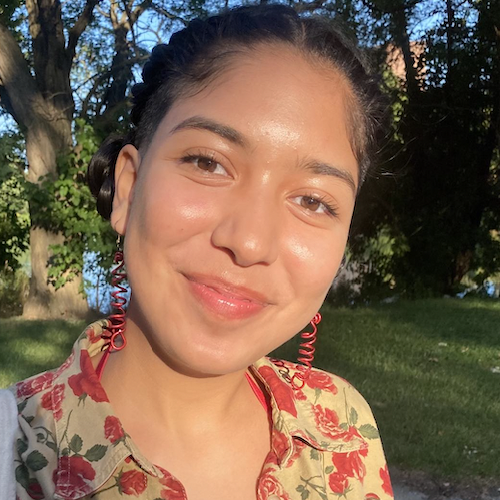Citlali was born in Mexico, and is undocumented. She arrived in the United States when she was one year old, and lived in Back of the Yards until she was ten. In the wake of Trump’s election to the presidency, Citlali participated in her high school’s Coming Out of the Shadows Day where she and about ten other undocumented students came forward, said their names, and announced that they were undocumented and unafraid. This group then came together to co-found a school club called the Dream Pursuers, which organized an annual Coming Out of the Shadows Day, and helped establish a scholarship for undocumented students. At the time of her interview, Citlali was a junior at DePaul University studying journalism and sociology. She met with us in the evening, after a long day of classes.
My mom was trying to figure out how to get across the border with us to meet my dad in Chicago. At first, she tried to cross with all of us; she didn’t want to come across the border separately. But the first time, it didn’t work out, so we had to come separately. My mom came in the trunk of a car. Then my siblings and I came with different families.
As a freshman, when Trump was elected I started to understand more about the implications of being undocumented. What is this going to mean for my future? So that’s when it all started being more relevant. I started being more involved and vocal about my story and being undocumented.
When DACA became available in 2012, my mom was like, “Okay, when you’re 16, you will apply to DACA,” but I didn’t apply until last year. I was an intern at the National Immigrant Justice Center, and they helped with the paperwork and to pay the fee to submit it. On my birthday I got my letter about my appointment for my biometrics, and then, I found out, right after opening the letter, that a judge had ruled to stop accepting DACA applications just the day before.
So that really sucked. I was really hurt. I felt like, after being someone who had been advocating for this since high school, even though like I’m talking about it and advocating, that doing that also made me remove myself—I don’t know if it makes sense—I feel like after a while I got removed from the issue. I had only been thinking about the collective impact of the issue but then I felt personally let down and hurt when I received that news.
I think about all the work I had done in high school, working with BPNC, and organizing fundraisers. I came to college and wanted to have the same sense of community and empowerment. But it’s not like that here, I can’t find that at DePaul. There is no student club or organization of undocumented students. I think about being a junior now, and I wish I had started something, but I found it harder to begin, to organize in a bigger place like a university, compared to highschool. Even when there are a few resources for undocumented students, it’s still not enough because it’s not fully integrated into the school. As long as their support continues to be like this, barely noticeable, then it’s just symbolic.
It’s hard dealing with this at the university level, and then having to let go of DACA at the same time. I feel like that was the biggest piece for me was letting go of DACA. Growing up, my mom always told me, “Don’t trust these politicians. They just get your hopes up,” but she also told me, “DACA’s gonna help you,” so overall it has been really hard to let go of that.
Despite feeling rejected over and over by DACA, I know I have a community here in Chicago that I belong to.
